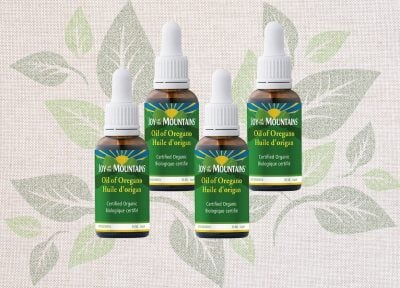Wild oregano oil (Origanum vulgare) is a broad-spectrum anti-pathogen – that means it kills bacteria, viruses, fungi and some parasites. Although it presents as the hottest chili pepper (for 2 minutes then the heat disappears), it’s action is actually anti-inflammatory. It has out-performed Vancomycin (antibiotic reserved for superbugs) in clinical trials and if you have any kind of gut infection, then wild oregano just may be your new best friend!
I’m going to show you 3 different remedies using wild oregano oil (diluted, or mixed with zinc oxide, or DMSO) that you can use to treat common issues with your horse (or dog).
I’ve used these mixtures to heal a hoof abscess, thrush, rain rot, lumps/growths, and more.
You can also download my free eBook on how to use wild oregano for humans and how to prepare the dilutions.
*Note: When you’re making the wild oregano and zinc oxide paste (as shown in the video), you can use regular commercial wild oregano (NOT essential oil) if applying to coat or hooves.
But if using on a sensitive area like the udder, sheath, underside of tail, perianal area, etc. then you must first dilute the wild oregano further to a 7:1 dilution (see my eBook for dilution instructions). Then mix the diluted wild oregano with zinc oxide.
Use a 10:1 dilution if area is super sensitive or painful (that’s the dilution used on babies skin).

And click here to purchase wild oregano oil in Canada.
We offer FREE SHIPPING in both Shoppes, and while you’re there, check out the other 100% natural supplements, healthy anti-inflammatory oils, and dried organic herbs we have!
p.s. Be sure to check out the JINI SAYS tab on each product in the Shoppe for my personal tips and recommendations.

Jini Patel Thompson is a natural health writer and Lazer Tapping instructor. She began riding at age 2 in Kenya, and got her first horse at age 8 in Alberta, and so continues a life-long journey and love affair with these amazing creatures.








You are an asset to the world, Jini Patel Thompson!! I’m all for natural medicine but wish I’d known about WOO when little 4 month-old Hannah (cat) was sterilised…poor little thing, she licked her stitches and the whole thing got infected and sceptic and she then had to take the vet’s standard prescription of antibiotics, cortisone and wear that cone…. She looked like a 19th century woman in a bonnet….
It’s very deep that the horses teach us so much about natural remedies and we should all be heeding their wisdom…. !
Thank you Ray! And yes, imagine if everyone knew about wild oregano and dogs and cats no longer had to wear the horrible head cone to prevent them licking surgical sites! I don’t know how they can even sleep in that thing – very uncomfortably I suspect.
Jini introduced me through the blog to WOO a few years ago and I have used it for personal use to heal ring worm! It is amazing stuff! I mentioned in a previous blog comment about Roofus our new family member Red bone hound that got his leg impaled on our decorative rod iron gate! The wound was deep and angry and I chose not to seek Vet care … Or apply anything to it except a few squirts of Vetrycin on day 5 as it looked scary and I started second guessing myself! One of my questions Jini is since you speak of animal wisdom …why would you want to suppress a dogs wisdom of licking a wound? We did wrap Roofus leg for 12 hours to stop the bleeding and then left it open ever since! So he was able to lick at will! He has been amazing at IMO not over licking! Everytime the wound starts to scab he licks it raw again! From what I have observed it looks like he might be doing this to keep it from closing up before it is ready! I also think allowing him to handle it himself has been an amazing learning experience!
I would also love to get into natural hygiene theory with you and species appropriate feeding as a support to healing….but do realize this is a horse blog so might not be the correct place to do so! Again I can’t say I agree completely with some of these theories but some of it has really resonated with me and would be so curious to hear your knowledge as I know you have oodles of experience with healing! ✌🏼💚🐴
Great question Michelle! And this plugs into the never-ending conundrum of wild vs. domesticated. A wild dog would never have surgical sutures, or internal surgery. If it’s genitals were somehow gorged out by a predator, it would likely die. Wild dogs live an average of 5 years. So once we start doing unnatural things to animals (which domestication necessitates), we create a domino-effect… and where does that end? How far are we willing to go in the paradigm of, “this sentient animal OWNS its body, not me” and therefore the animal has final say in ALL things, including its death.
If your dog says, don’t touch my wound, but you can see that it is infected and he is going to get sepsis and die… and you tell him this, and he says, “I don’t care.” Do you allow him to die? Because it is HIS body and his choice?
There are no easy answers to this conundrum. When Jax impaled his armpit and it was a very deep wound, I asked him if he wanted me to call the vet, and he said No, he would handle it. After 3 days I could smell something was brewing… and I told him I’m worried about infection and I think we should call the vet because I didn’t have the equipment to clean/flush it properly for him (although I do now!). He then agreed and I called the vet. But then Jax still controlled the cleaning schedule, how long and which drugs he took, etc. So he was still directing his healing process and still in charge – but also working with other resources/knowledge.
Same thing happened with Montaro when he sliced his heel. I told him he was going to have to rip off the flap of skin/tissue for his foot to be able to heal and I gave him a few days to do it. But he didn’t and he was weakening by the day. So again, on day 4 I told him (I did not ask him!), “I’m calling the vet. You had your chance, now I’m taking charge.” Because MY GUT told me to do that. And he didn’t argue with me.
So I guess what I’m saying, is that in my experience, there’s no set rules. Each case, each animal, each circumstance etc etc is unique. I’ve also told my horses, if you need to transition, then don’t get something stupid like colic! Go out in the field and have a tree fall on you at the exact angle required for a one-shot kill – that way I’ll KNOW you chose this. LOL.
This is life though right? Messy, winding, and ever expanding. Life is not about just staying SAFE. It’s about the journey.
How much zinc oxide do you mix in for topical application on dogs?
Hi Carmel – Start with 2 tablespoons of zinc oxide powder, then add 5 drops of wild oregano oil and mix well with a chopstick or popsicle stick. Add more oregano oil, 1-2 drops at time, and mix well with a chopstick each time. Zinc oxide like icing sugar, so you have to add the oil slowly and keep mixing to get it to the paste consistency.
I load down your E-book, bought the wild organ oil , not the EO ! but I could not find “how to use it on horses with sweet ich and in which area, in which dilution etc… Can you help me , you wrote about a horse who was in bad shape -i believe – due to sweet itch. Than you in advance to help my Islandais gelding, who is now 3 years ol and started the itch the last year.
Doris
I have two posts on using wild oregano for itching:
https://listentoyourhorse.com/wild-oregano-heals-horses-intense-bug-allergy-itching/
and
https://listentoyourhorse.com/remedies-for-horse-with-itchy-flaky-skin/
Let me know how your gelding does…
I’m a lassi internet-user, so I do not know, why I have to send a second comment.
Not sure what you mean here… but comments are all manually approved by me (to prevent spam) so there can be some delay.
These are wonderful to use, we have lots of horse flies and mosquitoes here and the horses love their oregano-olive oil mix ❤️ They love to lick it off my hands as well😊 But it’s quite expensive. I find that tar ointment also works well, most spots heal in just a day or two with it. Not for mane and tail though, cause it’s too greasy, and probably not as good for them – but it’s a lot cheaper.
If the tar oil is working well, does it also repel the insects? Or perhaps you could mix in a repellent essential oil? Like citronella, or lemon eucalyptus would work well. That would likely be cheaper than using wild oregano oil.
Yes, it has a slight repelling effect, but wares off quite fast. So good idea to ad some citrusy-oil.
Fun fact: traditionally in Finland we use an oil called ‘hjorthornsolja’ in Swedish to give the horses relief from the insects, this is a quote: “Consists of butchery products. According to SLU, deer antler oil is a classic deterrent. It is a dry distillate of various butchery by-products, such as horns, bones, cartilage, hooves, skins, hair and more. It is a brown, viscous liquid with a pungent odor.” But that’s way to heavy an odour for me😊
We also use ‘pitch oil’ traditionally, which is a lot nicer, another quote: “Pitch oil is produced from pine tar stumps during tar burning.” So it’s a bit related to the tar ointment, which is also traditionally Finish, it has antiseptic qualities. Here’s a third quote: “Tar has been used as a folk cream to treat infections and cracked skin.”
My dog actually had these small lumps of sort growing out of her skin that tended to get infected and I treated them with an ointment of, oh what is it called in English, the young shoots of fir tree that you collect in the beginning of summer? And they went away!
So interesting these old ways of treating skin that work so well🙏🏽❤️
Oh, and another one that amazes me is the traditional use of raw wool for treating bedsore on humans etc. It’s really good for treating mud rashes and other skins problems on horses as well.
I haven’t heard anything about that! But I know that if you sleep on a sheeps wool you will hugely reduce your chance of getting bedsores in the first place.
First Nations people here traditionally used bear grease to repel insects – same principle. And yes, I love pine oil and resin, but would love to see/feel the tar you’ve written about here!
Interesting, yes, same principle.
Here’s my tar ointment, sorry you can’t feel and smell it 😊
I was out of pitch-oil, but it’s this beautiful dark brown, almost black with kind of a golden glow; a thick oil or a runny ointment… You can see in that pic how greasy my hand is after applying the tar ointment on Geisla.
And Geisla, 37 y, posing, going ‘but this isn’t my grooming time, it’s my dinner time’. Luckily she got her dinner soon after ❤️
So the above is the pitch-oil, and here’s the tar ointment:
Yeah, it’s actually used in hospitals here.
Hi Jini, I have moved my horses from dry to humid climate in Australia and my horses are suffering terribly from rain rot. Hoping that your WOO and Zinc Oxide will provide some relief as I have tried so many natural remedies, I’ve lost count. I get a good feeling from your information provided and I just wanted to check please how often I can put this paste on my horses, it’s mostly on their face, ears and neck where there is no rug. Thanks in advance 🙂
Usually once per day is all that’s required. Try that for 5 days and see what happens. If you’re not seeing improvement then you could try twice per day. But definitely try once per day first. Too much is not better!
Let us know how it goes 😊
when making a spray for hooves how much dmso is added with the wild oregano? thank you!
Hi Meghan, do you mean for a hoof abscess? The formula and instructions are here:
https://listentoyourhorse.com/dmso-based-hoof-abscess-remedy/
Thank you so much ! My purchase of oil arrives tomorrow and I can’t wait to try it on my mare . I rescued her about a month ago and she has severe canker . All the vets we have seen said that they recommend putting her to rest but I just want to try with is one last thing with the wild oregano. She has abscess , canker and now from being stalled she has Lymphangitis. So I have my work cut out for me but I’m hoping to try the spray and the paste !! Thank you so much!!
Wow you have some challenges ahead. I have no experience with canker and Lymphangitis so please let us know how it goes. Wishing you both all the best!
Hi Jini,
My Dog has had a swollen back ankle for just under a week and yesterday it popped and is now oozy and abscess and is looking infected. I would like to keep her off of antibiotics if at all possible and started using some wild oregano oil to see if that will help it although I’m just not confident in exactly how to use it or how much/how often to apply.
My first thought was to drop some WOO in and around the abscess as well as apply it to the pads of her feet so she can get it into her system that way too. If this is correct, how often would you apply the WOO on the abscess? And would you give her WOO orally as well during the healing phase? Because it is weepy, would you recommend the zinc and WOO around the site as well until it dries up a bit?
Thank you for your insight and sharing your knowledge with us!
Hi Gwyneth, if I were you, I would ask my dog if she also wants WOO on the pads of her feet. I would definitely apply it topically, at a 4:1 dilution – 4 drops organic extra virgin olive oil, to 1 drop commercial (NOT essential) wild oregano oil. If you apply it undiluted, it may feel so unpleasant that she won’t let you apply it again. But again, ask her as she knows what is best for her body.
I don’t think it’s necessary to give it orally, since there is far less efficacy to oral ingestion with a localized abscess like that… but again, ask her! You can show her the woo gelcaps and let her sniff them, and if she agrees (or you get a feeling it would be good for her body), then you administer like a pill where you push it to the back of her throat (YouTube has instruction videos). You don’t mix it with food.
Personally, I would start with only WOO on the abscess (cleaning it with warm water to remove pus each time before applying) and see how it goes. Again, if your intuition is telling you it needs to dry out a bit, then apply the woo/zinc paste. You may alternate back and forth between the two.
Hope that helps and let us know how it goes!
Hi Jini, I have an elderly horse who contracted Pigeon Fever (Corynebacterium pseudotuberculosis) He is 33+ years old and has multiple abscesses on his body-chest and leg.. How would I use wild oregano oil in this situation? He is currently taking an antibiotic but I’m thinking wild oregano oil would work better? Thank you
Hi Leslie, If it were my horse, I would use it the same way humans in this situation would use it. Most would stay on the oral antibiotic (whether drug or natural) AND simultaneously treat topically with wild oregano on the abscesses. You could start with a 4:1 dilution (4 parts extra-virgin organic olive oil to 1 part wild oregano oil) and see if that is strong enough. That won’t sting him so is a good place to start and may be all he needs. If you’re not seeing healing/improvement in 3-4 days, then I would switch to the full-strength wild oregano, right out of the bottle (one of the brands I recommend, NOT essential oil of oregano).
For humans, if full-strength is still not strong enough, then we add DMSO to drive it into the tissues, and we also add SSKI (super saturated potassium iodide) and colloidal silver (minimum 22ppm). I have some formulas here that humans have used in case you need them:
https://blog.listentoyourgut.com/perianal-abscess-natural-remedy/
There’s a lot of comments at the end of that article, but they contain good first-hand experience.
And if you buy the 4-pack then you get my wild oregano ebook for free, with the instructions for how to prepare the dilutions and a few other helpful formulas for horses:
https://shoppe.listentoyourhorse.com/en-ca/products/4-pack-wild-oregano-oil-free-ebook
Hope that helps!
Thank you so much for this!!
You’re very welcome! Let us know how it goes.